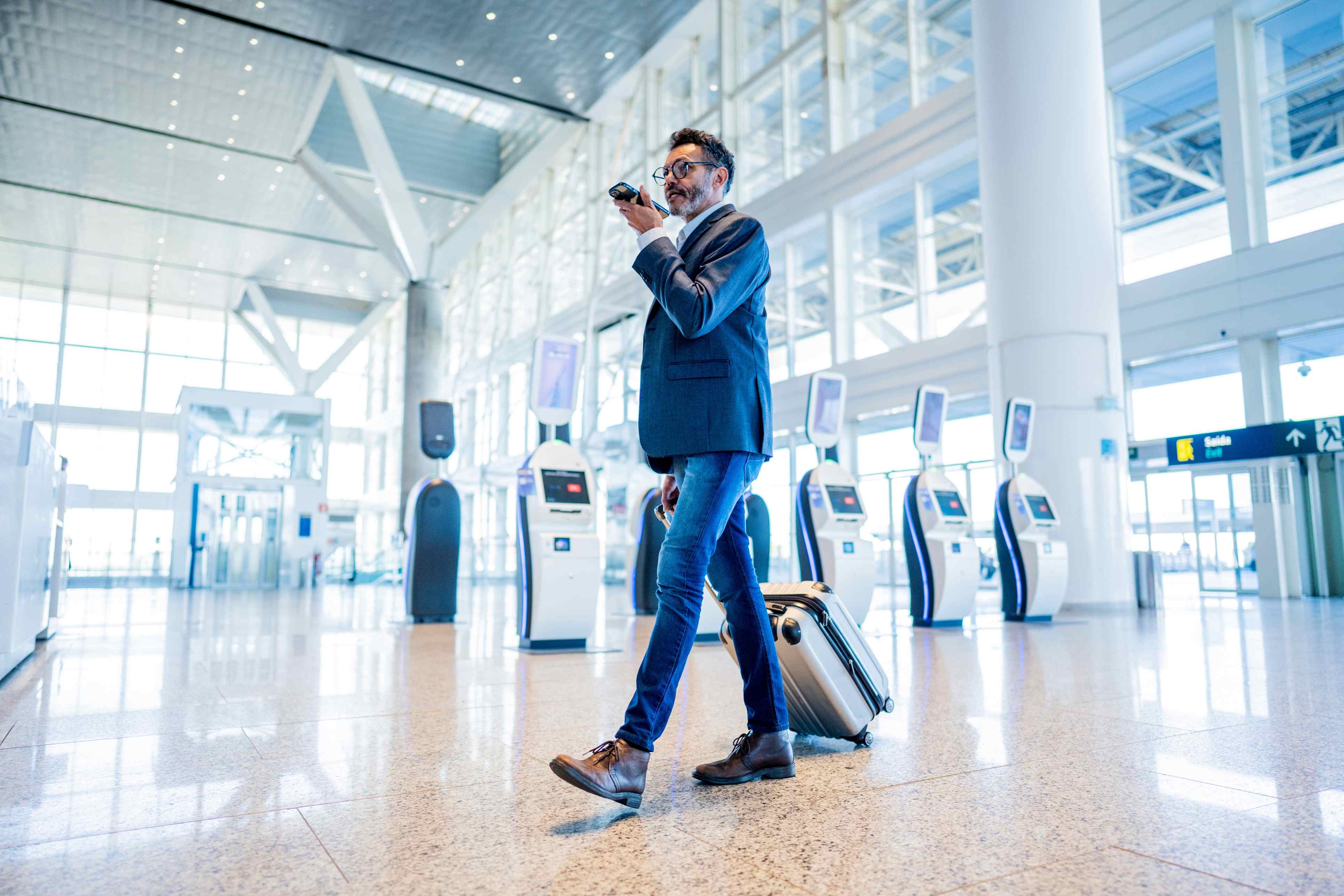 Reading Time: 6 minutes
Reading Time: 6 minutesTravel and AI
Gone are the days when travelers relied solely on guidebooks and travel agents to plan their perfect getaways. Gone are also the days when travelers booked through vanilla online travel agents and booking sites! In today’s fast-paced, digitally driven world, travelers seek more personalized and unique experiences, tailored specifically to their tastes and preferences. Enter artificial intelligence (AI), a game-changer in the travel hospitality industry. From personalized destination suggestions to tailored accommodation options, AI is at the forefront of reshaping how travelers plan and experience their journeys. The integration of AI into the travel sector not only enhances customer satisfaction but also propels businesses towards efficiency and innovation.
Industry facts and figures
The travel industry’s adoption of AI is on a steep upward trend. Alex Cosmas of McKinsey says, “Gen AI alone, across sectors, is bound to unlock $2 trillion to $4 trillion of incremental value.”Worldmetrics.org indicates that AI technologies can increase revenue by 10-25% for the travel industry. It also predicts that 3 out of 4 travel companies will implement AI in their business operations in the next three years.
AI’s impact on customer experience is undeniable. Personalized travel recommendations powered by AI have transformed mundane travel searches into dynamic and engaging interactions. For instance, AI algorithms can analyze vast datasets, including past travel behavior, preferences, and social media activity, to predict and suggest destinations, accommodations, and activities that align perfectly with a traveler’s unique profile. While 75% of travelers are open to receiving personalized travel recommendations from AI, 57% are comfortable with AI helping them plan their travel [Worldmetrics.org].
But let us first understand what we mean by AI and recommendations:
- AI encompasses a broader set of technologies that simulate human intelligence. It includes machine learning, natural language processing, and other techniques.AI can handle complex tasks beyond recommendations, such as predictive analytics, chatbots, and decision-making. For example, an AI-powered chatbot assists travelers by answering queries, suggesting personalized itineraries, and handling booking changes.
- On the other hand, recommendation engines are a specific subset of AI. They focus on suggesting relevant items based on user preferences and historical data. These engines analyze patterns, user behavior, and content to provide personalized recommendations. For example, a hotel booking website uses a recommendation engine to suggest hotels based on a traveler’s past preferences, location, and budget.
In summary, AI encompasses a wider range of capabilities, while recommendation engines specialize in personalized suggestions.
Testaments to AI in travel
While several key players in the travel hospitality market are harnessing the power of AI to deliver personalized travel recommendations, here are some famous examples.
- Expedia- Utilizing AI and machine learning, Expedia offers personalized suggestions for destinations, hotels, and activities based on user data. The company’s AI-powered chatbots assist customers in real time, providing tailored travel advice and support.
- Booking.com- Known for its advanced AI algorithms, Booking.com uses machine learning to analyze customer reviews and preferences, offering customized accommodation recommendations. Their AI-driven systems also predict property availability and pricing trends, helping travelers make informed choices.
- Traveloka- This Southeast Asian travel giant employs AI to deliver personalized travel packages. By analyzing user behavior and preferences, Traveloka offers bespoke recommendations for flights, hotels, and activities, ensuring a seamless booking experience.
These examples depict how AI is revolutionizing the travel industry, delivering unprecedented levels of personalization and customer satisfaction. Let us dissect the “how” and “what” now.
Placing customer behavior at the forefront
AI recommendation engines excel at understanding and segmenting customer behavior. These engines can create detailed user profiles by analyzing data such as browsing history, booking patterns, and even demographic information. Here’s how they do it:
- Behavioral analysis- AI algorithms track users’ interactions with websites and apps, identifying patterns and preferences. For example, if a user frequently searches for beach destinations, the algorithm will prioritize similar locations in future recommendations.
- Preference learning- AI systems use machine learning techniques to learn a traveler’s likes and dislikes over time. This continuous learning process ensures that recommendations evolve with the user’s changing tastes.
- Travel history- By examining past trips and bookings, AI models can predict what type of experiences a traveler might enjoy in the future. This historical data is invaluable in delivering contextually relevant suggestions.
- Customer segmentation: AI can segment users into different categories based on their behavior, preferences, and demographics. This segmentation allows for more targeted and customized recommendations, enhancing the overall travel experience.
Choosing the right AI model
AI-driven recommendation engines are highly effective due to their ability to quickly process and analyze large volumes of data. They can adapt to changing preferences and provide timely and personalized recommendations. Various AI models are employed within the travel industry to deliver personalized recommendations. These models include:
- Collaborative filtering- This model leverages data from multiple users to recommend destinations or activities based on shared preferences. For instance, if travelers with similar interests frequently visit a particular destination, the algorithm will suggest it to new users with matching profiles.
- Content-based filtering- This model focuses on the traveler’s preferences and history. For example, if a traveler often books luxury hotels, the algorithm will prioritize similar high-end accommodation options in future searches.
- Hybrid models: Hybrid models combine collaborative and content-based filtering and use the strengths of both to deliver more accurate and diverse recommendations.
- Contextual bandits: These models consider real-time data, such as current location, time of day, and weather conditions, to provide timely and relevant suggestions. They are also called multi-world testing, associative bandits, learning with partial feedback, learning or multi-class classification with bandit feedback, bandits with side information, associative reinforcement learning, and one-step reinforcement learning.
Making progress, creating impact
While AI significantly impacts several key performance indicators (KPIs) and metrics across various segments of the sector, here are the key ones related to creating a good customer experience.
- Conversion rates- AI-driven personalization in online travel agencies (OTAs) and metasearch engines is boosting conversion rates by presenting more relevant offers to potential travelers.
- Net Promoter Score (NPS)- AI-enhanced customer service, such as 24/7 chatbots and personalized recommendations, is improving overall customer satisfaction and loyalty, reflected in higher NPS.
- Average Booking Value (ABV)- AI-powered recommendation engines are suggesting higher-value packages and add-ons, potentially increasing ABV.
- Ancillary revenue- AI algorithms are better at upselling and cross-selling, increasing ancillary revenue for airlines, hotels, and tour operators. This also allows businesses to expand horizontally, providing newer avenues for engaging customers.
- Customer Lifetime Value (CLV)- AI-driven personalization and loyalty programs are helping increase repeat bookings and overall CLV.
- Time on Site and engagement rates- AI-enhanced user experiences on travel websites and apps are improving Time on Site and engagement rate metrics, leading to higher conversion chances.
- Customer churn rate- Predictive analytics help identify at-risk customers, allowing for proactive retention strategies and reducing churn.
- Customer Acquisition Cost (CAC)- AI-optimized marketing campaigns and chatbots are reducing CAC by more efficiently targeting high-value prospects.
These KPIs showcase how AI is revolutionizing the travel industry by enhancing the customer experience and driving the industry towards increased business and profitability.
Navigating the AI risks
While AI is proving to be a must-have in the travel industry, the AI landscape is starting to formalize. Legal and ethical guardrails are beginning to form. It is imperative to understand the risks of AI in the industry before applying them broadly. The customer is king, and the safety and satisfaction of customer is key.
Here are some areas of risk in AI, and the ways to navigate them:
- Data privacy and security- AI systems require vast amounts of customer data to function effectively which increases vulnerability to data breaches and potential misuse of personal information.AI systems increasingly becoming targets for cyber-attacks, and compromised AI could lead to system-wide failures or manipulated outcomes.
- Algorithmic bias- AI systems may inadvertently perpetuate or amplify existing biases, leading to unfair treatment or discrimination against certain traveler groups. AI systems could also make errors or provide inaccurate recommendations.
- Over-reliance on technology- Excessive dependence on AI systems for critical operations where system failures could lead to significant disruptions.
- Job displacement and lack of human touch- Automation of roles traditionally performed by humans could lead to potential job losses in the industry, particularly in customer service. Overuse of AI in customer interactions could also lead to the loss of personalized, empathetic service that many travelers value.
- Transparency Issues: “Black box” AI systems make opaque decisions, making it difficult to explain AI-driven decisions to customers or regulators.
- Ethical Considerations: AI may make decisions that are legally compliant but ethically questionable, potentially damaging brand reputation and customer trust.
- Cultural insensitivity: AI can fail to understand cultural nuances in global travel, offending customers or providing inappropriate recommendations.
We have evolved to understand that customer satisfaction is the core of every business, and AI can drive it effectively. The best way to be successful in this area is to work around the risks involved.
Here are some simple, yet powerful ways to do so:
- Prioritize ethical AI development and use.
- Invest in robust data protection and cybersecurity measures.
- Maintain human oversight and intervention capabilities.
- Regularly audit and test AI systems for bias, accuracy, and reliability.
- Stay informed about regulatory developments and ensure compliance.
- Foster a culture of transparency in AI use and decision-making.
Conclusion
As the travel industry continues to evolve, the integration of AI offers exciting opportunities for enhancing personalized experiences. Today’s travelers are more tech-savvy than ever, seeking unique, tailored journeys that cater to their individual tastes. AI’s ability to analyze vast amounts of data and deliver precise recommendations positions it as a crucial tool in meeting these demands.
But as AI technology advances, a thought-provoking question arises: Can AI continually adapt to meet the evolving needs and unsaid requirements of travelers, ensuring that each recommendation is as personalized and accurate as possible, securely and ethically? The future of travel rests on AI’s ability to keep pace with the dynamic preferences of the modern traveler and your ability to wield its capabilities effectively.
References
1. https://worldmetrics.org/ai-in-the-travel-industry-statistics/





